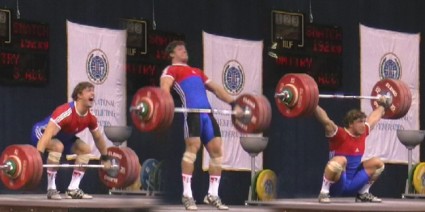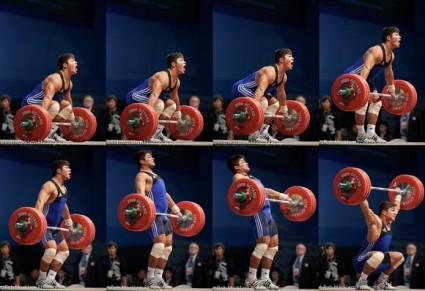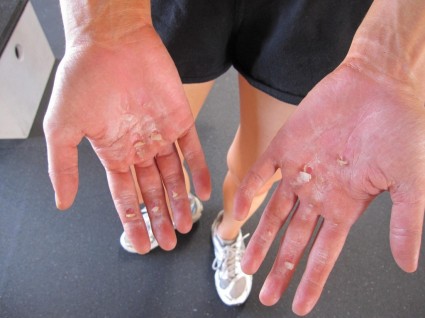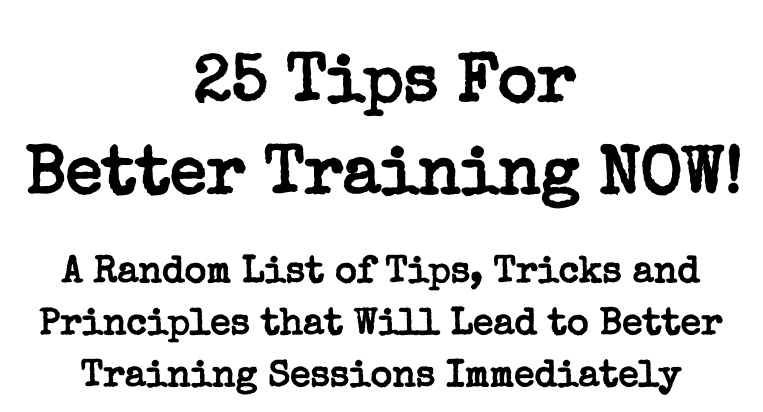There are NO new exercises.
TRX?
Olympic rings have been around for….over a thousand years.
Kettlebells?
Only…..about 200 or so.
Because of this exercises come and go in popularity and I’ve been around long enough to have been through an entire cycle of this.
Case in point: The Olympic lifts
from owresource.com
When I first started training people the Olympic lifts were THE way to develop power and you saw the Clean and the Snatch included in popular fitness magazines and at conferences people had entire lectures about them.
Then the pendulum swung the other way and NO ONE used the Olympic lifts anymore, they were:
- Too difficult to teach.
- Too dangerous.
- Not applicable.
- Too technical.
- Painful for wrists, elbows, shoulders and backs.
Now the “O” lifts are back in full force and I’m seeing them more again.
When this happens, it leads me to believe that maybe there is a reason they went away.
Maybe they aren’t “keepers” but instead need to be thrown back into the swamp of misfit exercises.
She’s a Keeper…..
What constitutes a Keeper:
- It serves it’s purpose: (Strength, Power, Mobility etc)
- It’s easy on the client: (No pain with correct technique)
- Low learning curve. (I don’t have to spend an hour a week just to get the technique to not suck)
What makes me want to throw an exercise away:
- Doesn’t serve it’s purpose.
- Painful/ uncomfortable execution.
- High learning curve.
- “Hard” on my client. <—-some exercises just plain “beat people up”
BSS or Rear Foot Elevated Split Squat:
Why might we throw this out?
Cause we’re stupid pussy’s, sometimes it creates pain in the anterior hip, back foot.
Why might we keep this one?
There are too many good things going on here not to include this in a program.
- Hip mobility
- Hip Flexor stretching
- Glute activation
- Lesser load on the spine than traditional squats
The pain in the foot and hip are indicators that:
- Your hip flexors are too tight
- Your ankle lacks plantar flexion
- Your Plantar Fascia is too tight and matted down
This exercise fixes problems 1 and 2 ….
This is a STAPLE exercise in my mind.
(Almost) Every person I train (who has the physical capability) does this exercise.
It’s a Keeper!
Skull Crusher (triceps extension):
From secondchancelifestyle.com
Why might we throw this out?
Cause it places an extreme amount of tension on the triceps tendon across the elbow when in a fully stretched position.
Why might we keep it?
It’s an awesome triceps builder and most successful bodybuilders swear by them for triceps development.
However:
The triceps tendon runs right over the elbow…that’s soft tissue running across hard tissue, while loaded and maximally stretched…this sounds like a bad thing to me.
conquestchronicles.com
If you can conceptualize the angle of the elbow during a “Skull Crusher” and the tension on the Triceps tendon it’s pretty easy to see how this would create rubbing across the bone and pain easily.
When you talk to high level powerlifters and professional or college strength coaches about what exercises they no longer do Skull Crushers come up time and again.
ALL of them cite elbow pain being associated with them.
On a personal level these are one of those exercises that I’ll do every 12 months or so during a deload week.
I get this bright idea that I won’t have pain this time……and I get a nice sore elbow the next day.
Obviously, throw this one back.
Olympic Lifts:
Why might we keep these one?
- Develop speed
- Power
- Strength
- Look cool
- They’re fun
Why throw them away?
I can develop all those things, just as well, with other exercises that put my body in less stressful/ potentially damaging positions.
With things like Med Ball throws and jumps I can still develop the speed and power I want from the Olympic lifts without having to subject my wrists, elbows, shoulders and low back to the stresses associated with Olympic lifting.
True, using perfect technique would mean NONE of these things happen.
Only problem is that it’s REALLY HARD , even for experienced, WORLD CLASS Olympic lifters to have perfect technique in theses lifts because these lifts need an incredible level of mobility and are executed at such a high-speed.
The skill component is so high that I simply don’t have the time or desire to practice enough to make including these in a program worthwhile.
Unless you plan on competing in Olympic lifting, Throw em’ out.
* A word on the Olympic lifts: the common defense of the Olympic Lifts is that the develop speed, power and athleticism better than ANY other modality.
This is not only untrue but verifiably illogical.
Sprinting, Jumping and Throwing ALL illicit higher speed and power output than the Olympic lifts. If the Olympic lifts develop athleticism better than any other modality then that should mean the best Olympic lifters would be the best performers at other sports….
I don’t care how much Adrian Peterson Cleans and Snatches, but I’m guessing it’s not this much….
and if I have first pick for the flag football league…I’m not taking Pyros Dimas.
Buddy Morris explains this better than me:
Point is ALL things done in the weight room are BY THE DEFINITION of DYNAMIC CORRESPONDENCE, general conditioning for all sports except Powerlifting (squat, bench, dead) and Weight lifting (Snatch, Clean and Jerk).
If I can get the same outcome with an easier path, why use the more difficult, time-consuming, stressful path?
Single Leg Dead Lift:
Why would we throw this out?
It has a HUGE learning curve (compared to many exercises) for most people.
Why would we keep it?
It may be the only hip dominant exercise that, when executed even kinda right, is almost completely spine sparing.
Many, many, many of my clients have Lumbar and Pelvic issues, yet I can get a loaded Hip Hinging pattern in their workouts (eventually) with this exercise.
Teaching hinging from the hips with two feet on the ground can be very difficult I find for two reasons:
- They don’t even have the motor pattern to begin with…they don’t know what a “hip” is.
- They’re scared to use the hips because they associate this movement with pain because they have a faulty movement pattern creating motion using the back not the hips.
This movement allows most people to learn the hip hinge PAIN FREE, reclaim this movement pattern, and take a ton of stress off their backs.
The easiest way to get over the learning curve is to begin with including it in the warm-up UNLOADED and usually supported.
This exercise reinforces a stable lumbar spine, hip hinging, loading and moving from the glute.
ALL things people need to do to move well.
Keep it, Keep it, do it Today.
Kettlebell Snatch:
Why we would keep this?
Good for power development, hip strength and shoulder stability.
Why would we throw this one out?
- Looong learning curve. <—–not like the O’ lifts but it doesn’t come easy.
- Wrist/ Forearm Pain. The bell bangs the forearms in most inexperienced (and experienced) users.
- Most people use too much lumbar (low back) extension. <——But in reality, this is YOUR problem, not the exercises fault, but it is a common error that’s really difficult to stop.
The truth is the kettlebell shouldn’t cause wrist and forearm pain, but it does in the vast majority of people, there’s a fine line with the technique here.
Here’s the crux of the problem:
It’s rarely done correctly, and for 99% of the population, it takes too long to learn.
Why waste time with this when I can get the same hip effect from the Swing and the shoulder stability aspect from Waiters Carries and Bottom’s Up Presses.
Have people leave the gym in pain unless it’s CrossFit, they like that sh@t and they’re not coming back.
Most the people I train have lives to live and want to get better not hurt. They would rather NOT have a big ass bruise on their forearm or torn up hands, just a fact of life.
Do this to someone, chances are, they’re NOT coming back. http://therxreview.com
Before I get hate mail. I’m saying any of these exercises do not work, cannot be learned or are dangerous and painful for everyone.
I’m saying, in general, there are better exercises to use that will give you the same or better outcomes.
“Get the most from the least, not the least from the most”- James Smith via Charlie Francis








